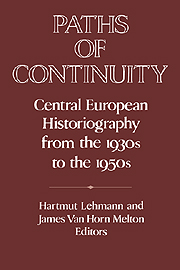Book contents
- Frontmatter
- Introduction: Continuities in German Historical Scholarship, 1933-1960
- 1 German Historiography from the 1930s to the 1950s
- 2 Friedrich Meinecke (1862-1954)
- 3 Change and Continuity in German Historiography from 1933 into the Early 1950s: Gerhard Ritter (1888-1967)
- 4 Hans Rothfels (1891-1976)
- 5 Franz Schnabel (1887-1966)
- 6 Heinrich Ritter von Srbik (1878-1951)
- 7 “Historical Social Science” and Political Myth: Hans Freyer (1887-1969) and the Genealogy of Social History in West Germany
- 8 Some Observations on the Work of Hermann Aubin (1885-1969)
- 9 From Folk History to Structural History: Otto Brunner (1898-1982) and the Radical-Conservative Roots of German Social History
- 10 Werner Conze (1910-1986): The Measure of History and the Historian's Measures
- 11 Continuity, Innovation, and Self-Reflection in Late Historicism: Theodor Schieder (1908-1984)
- Index
4 - Hans Rothfels (1891-1976)
Published online by Cambridge University Press: 05 January 2013
- Frontmatter
- Introduction: Continuities in German Historical Scholarship, 1933-1960
- 1 German Historiography from the 1930s to the 1950s
- 2 Friedrich Meinecke (1862-1954)
- 3 Change and Continuity in German Historiography from 1933 into the Early 1950s: Gerhard Ritter (1888-1967)
- 4 Hans Rothfels (1891-1976)
- 5 Franz Schnabel (1887-1966)
- 6 Heinrich Ritter von Srbik (1878-1951)
- 7 “Historical Social Science” and Political Myth: Hans Freyer (1887-1969) and the Genealogy of Social History in West Germany
- 8 Some Observations on the Work of Hermann Aubin (1885-1969)
- 9 From Folk History to Structural History: Otto Brunner (1898-1982) and the Radical-Conservative Roots of German Social History
- 10 Werner Conze (1910-1986): The Measure of History and the Historian's Measures
- 11 Continuity, Innovation, and Self-Reflection in Late Historicism: Theodor Schieder (1908-1984)
- Index
Summary
In his congratulatory message to Hans Rothfels on the occasion of Rothfels' seventieth birthday, Theodor Schieder pinpointed him, the student of Friedrich Meinecke's and Hermann Oncken's, as belonging to the “Enkelgeneration” of German historians. As the founding fathers, so to speak, of German history he identified Ranke, Sybel, and Treitschke. The problem of change and continuity, especially in Rothfels' case, must be projected backward into the academic past as much as it must be tested forward on his own life and work.
Of course it was Ranke above all others who served as a model for the mainline German historians of our century, whether they were “sons” or “grandsons.” His often quoted and often misunderstood maxim that the historian was to relate “wie es eigentlichgewesen” did indeed mean that he aspired toward objectivity, thus to “extinguish,” as he put it, the self. But far from giving himself to the illusion that he could ever reach this aim, he was keenly aware of the fact that “the subjective element” introduced itself “as a matter of course.” No illusion and no boast led him to state his maxim, but rather a sense of self-restraint. History, as he observed and conceived it, was not ultimately the construct of men, and the historian accordingly was relegated to bear witness to a world that ultimately was unfathomable and full of mystery. Ranke's conviction that it was the “wings of God,” not man, that ultimately hovered over the affairs of this world was echoed also by the generations of his disciples. Meinecke saw in history a “divine service in the broadest sense,” just as Rothfels paid tribute to the “anonymous forces” that transcended the causal chain of events.
- Type
- Chapter
- Information
- Paths of ContinuityCentral European Historiography from the 1930s to the 1950s, pp. 119 - 154Publisher: Cambridge University PressPrint publication year: 1994



